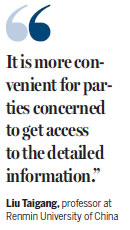Guideline explains criteria for registering an office and operating on the mainland
China's top security authority has issued a guideline for overseas NGOs to operate on the mainland, providing detailed rules for them to register a representative office and organize events.
The Ministry of Public Security published the guideline on Monday on its website, saying the document was rolled out in accordance with a law on the management of overseas NGOs that was passed by the top legislature in April.
The law, which will take effect on Jan 1, designates the Ministry of Public Security and provincial police authorities to be in charge of the registration and management of overseas NGOs on the Chinese mainland.
In the guideline, the ministry lists the qualifications and procedures for NGOs to register or to close their offices as well as the documents needed for an annual review of their operation.

According to the provisions, overseas NGOs must be legitimately established outside the Chinese mainland and be able to bear civil liability independently, and they must have operated for at least two years before applying to set up an office on the mainland.
Also required for registration are the organization's charter, the source of its funding and its planned location on the mainland. Additionally, the organization's chief representative in China must not have a criminal record.
While registering, an overseas NGO should specify the region where it plans to conduct activities in China, either within a single provincial-level region or across more than one such region. The area should be in line with its scope of business and actual needs, the guideline says.
Liu Taigang, a professor of governance at Renmin University of China, said clearer, more transparent rules for the performance of NGOs have been introduced, which is an important step in advancing the rule of law.
"Since the guideline was made public, it is more convenient for parties concerned to get access to the detailed information. It clearly explains the criteria for setting up a representative office, lists all the documents needed for registration and provides even the telephone number of the management office for NGOs under the Public Security Ministry," he said.
On Nov 8, the ministry and the Shanghai Public Security Bureau jointly organized a meeting to brief consulates in Shanghai about the detailed rules.
The law caused some concern among overseas NGOs during its drafting, since they worried that their operations and activities would be restricted.
Zhang Yong, deputy director of the Legislative Affairs Commission of the Standing Committee of the National People's Congress, said such worries were "totally unnecessary if (the overseas NGOs) follow Chinese laws".
zhang_yi@chinadaily.com.cn
